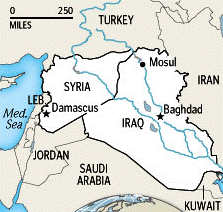UPDATES
Syria’s Iraqi refugees flee Syria, highlighting regional changes
July 15, 2011 | Geoffrey Levin

While Turkey has attracted much media attention for its willingness to take in Syrian refugees in the camps it has set up near the border, many Syrians have fled to other neighbouring countries such as Iraq. Thousands of Iraqi refugees who fled Iraq for Syria due to the war are now fleeing Syria back to their home country. Agence France-Presse reports:
Hayat Saad, legal officer at the Baghdad Refugee Centre, said “every day we deal with between 60 to 70 cases of families who have returned to the country…Daily, about 20 come from Syria — the largest contingent — followed by Egypt, Jordan, Yemen and Libya,” she added.
Since the beginning of May, 1,171 families – about 7,000 people – have returned from Syria, and three-quarters have taken up residence in Baghdad province, the International Organisation for Migration told AFP.
Qahtan Sabri, a 61-year-old carpenter, went to Damascus in 2005. “The situation was getting worse day-by-day. The confessional killings were increasing, and I had to stop working…I decided to return to Iraq when I realised that security is better in my own country than in Syria. I have resumed my business and will never leave my country.”
This development highlights just how much things have changed recently in the two countries, as such a report would have been unimaginable only a few years ago. Annual civilian casualties in Iraq reached an all-time low in 2010 since the war began, and will likely continue to drop in 2011.
Meanwhile, over 1,500 Syrians have already died this year, most of whom were victims of their own government’s violent repression. The fact that the three quasi-democratic entities in the Arab world – Iraq, Lebanon, and the Palestinian Authority – have so far largely been spared the protests and violent counter-protest actions of the Arab Spring should be instructive, as democracy remains the only way to allocate power through a peaceful and fair political process.
Yet the three quasi-democracies all suffer a different chronic condition; the prevalence of radical Islamist organisations – in Iraq, Islamist insurgents still continue to wreak havoc with occasional terrorist attacks, while in Lebanon and the Palestinian territories, Islamist groups effectively control certain regions, threatening stability, peace, and democracy. This sums up the great paradox of Arab governance – no Arab country has both held free and fair elections while also maintaining a monopoly on the use of force in their own lands. Thus every Arab nation has always either faced brutality from their tyrannical government or from the Islamist groups that oppose their government, or both. The challenge ahead for the Arab states ‘liberated’ during the Arab Spring will be to overcome these dual challenges facing Arab governance, finding a way to balance both democratic freedom and state sovereignty in a way none have thus far.
Tags: Iraq





